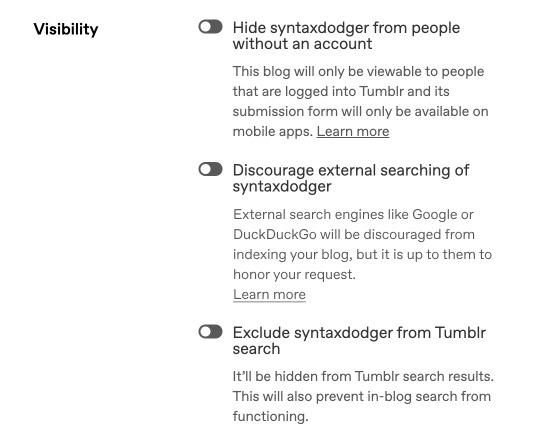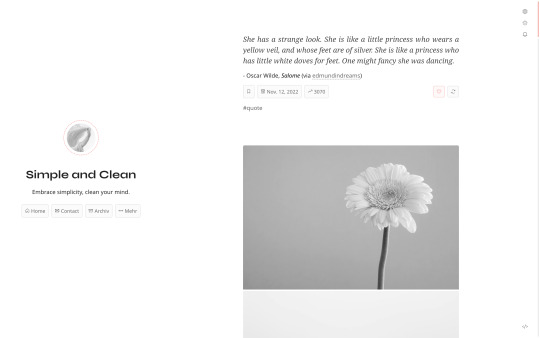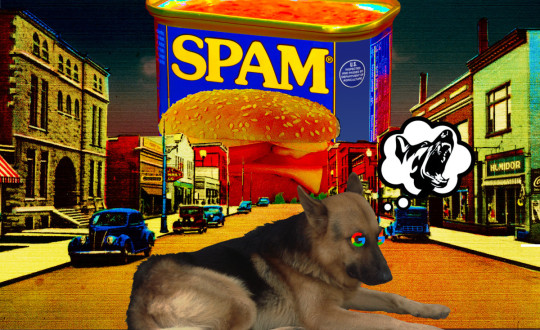#search
Photo

Late night searches. A fear submitted by Jackie to Deep Dark Fears - thanks!
You can find original art in my shop!
#comics#Deep Dark Fears#DeepDarkFears#scary movies#fear#scary#sketch#sketchbook#art#illustration#watercolor#nightmares#nightmare#phone#search#mania
8K notes
·
View notes
Note
I recently encountered yet another tumblr user who didn't realize that the Blog Settings option to hide your blog from search engines also includes tumblr's own search. It's surprisingly common in my experience, where people for years complain that search is broken for their blog, or that their posts don't show up in the public tags/search, but have no idea it was their own choice that put them in that situation. I know that the explainer text for the "discourage searching of [blog]" option is definitely more detailed than it used be, but if you haven't checked your settings since then, well...
Anyway, is it possible that the option could be separated into "hide from external search engines" and "hide from tumblr's search"? For people who would prefer not to be googleable (and assumed that's the only thing the option was doing) but are ok with their posts showing up in tumblr's own search.
Or possibly the options could be "hide from external search engines" and "turn off tumblr search for my blog"? Or at the very least, could there be further explainer text that hiding your from tumblr's search means that your blog's own searchbar won't ever find anything?
Answer: Hello, @nobodysuspectsthebutterfly!
Well, what do you know. We were looking at this same issue just recently and could not agree more: this setting really should be separated. Ideally, it would look a little something like this:

We need to take another look at this, as splitting search settings into Tumblrs vs. others makes a whole lot of sense. What is less clear is when a member of the team will have the capacity to work on it.
But rest assured we will be adding this to our agenda, and will be in touch with you with updates as and when we have them. And we hope you do not have to wait too long for news on this. We’ll keep you posted!
2K notes
·
View notes
Text
Too big to care

I'm on tour with my new, nationally bestselling novel The Bezzle! Catch me in BOSTON with Randall "XKCD" Munroe (Apr 11), then PROVIDENCE (Apr 12), and beyond!

Remember the first time you used Google search? It was like magic. After years of progressively worsening search quality from Altavista and Yahoo, Google was literally stunning, a gateway to the very best things on the internet.
Today, Google has a 90% search market-share. They got it the hard way: they cheated. Google spends tens of billions of dollars on payola in order to ensure that they are the default search engine behind every search box you encounter on every device, every service and every website:
https://pluralistic.net/2023/10/03/not-feeling-lucky/#fundamental-laws-of-economics
Not coincidentally, Google's search is getting progressively, monotonically worse. It is a cesspool of botshit, spam, scams, and nonsense. Important resources that I never bothered to bookmark because I could find them with a quick Google search no longer show up in the first ten screens of results:
https://pluralistic.net/2024/02/21/im-feeling-unlucky/#not-up-to-the-task
Even after all that payola, Google is still absurdly profitable. They have so much money, they were able to do a $80 billion stock buyback. Just a few months later, Google fired 12,000 skilled technical workers. Essentially, Google is saying that they don't need to spend money on quality, because we're all locked into using Google search. It's cheaper to buy the default search box everywhere in the world than it is to make a product that is so good that even if we tried another search engine, we'd still prefer Google.
This is enshittification. Google is shifting value away from end users (searchers) and business customers (advertisers, publishers and merchants) to itself:
https://pluralistic.net/2024/03/05/the-map-is-not-the-territory/#apor-locksmith
And here's the thing: there are search engines out there that are so good that if you just try them, you'll get that same feeling you got the first time you tried Google.
When I was in Tucson last month on my book-tour for my new novel The Bezzle, I crashed with my pals Patrick and Teresa Nielsen Hayden. I've know them since I was a teenager (Patrick is my editor).
We were sitting in his living room on our laptops – just like old times! – and Patrick asked me if I'd tried Kagi, a new search-engine.
Teresa chimed in, extolling the advanced search features, the "lenses" that surfaced specific kinds of resources on the web.
I hadn't even heard of Kagi, but the Nielsen Haydens are among the most effective researchers I know – both in their professional editorial lives and in their many obsessive hobbies. If it was good enough for them…
I tried it. It was magic.
No, seriously. All those things Google couldn't find anymore? Top of the search pile. Queries that generated pages of spam in Google results? Fucking pristine on Kagi – the right answers, over and over again.
That was before I started playing with Kagi's lenses and other bells and whistles, which elevated the search experience from "magic" to sorcerous.
The catch is that Kagi costs money – after 100 queries, they want you to cough up $10/month ($14 for a couple or $20 for a family with up to six accounts, and some kid-specific features):
https://kagi.com/settings?p=billing_plan&plan=family
I immediately bought a family plan. I've been using it for a month. I've basically stopped using Google search altogether.
Kagi just let me get a lot more done, and I assumed that they were some kind of wildly capitalized startup that was running their own crawl and and their own data-centers. But this morning, I read Jason Koebler's 404 Media report on his own experiences using it:
https://www.404media.co/friendship-ended-with-google-now-kagi-is-my-best-friend/
Koebler's piece contained a key detail that I'd somehow missed:
When you search on Kagi, the service makes a series of “anonymized API calls to traditional search indexes like Google, Yandex, Mojeek, and Brave,” as well as a handful of other specialized search engines, Wikimedia Commons, Flickr, etc. Kagi then combines this with its own web index and news index (for news searches) to build the results pages that you see. So, essentially, you are getting some mix of Google search results combined with results from other indexes.
In other words: Kagi is a heavily customized, anonymized front-end to Google.
The implications of this are stunning. It means that Google's enshittified search-results are a choice. Those ad-strewn, sub-Altavista, spam-drowned search pages are a feature, not a bug. Google prefers those results to Kagi, because Google makes more money out of shit than they would out of delivering a good product:
https://www.theverge.com/2024/4/2/24117976/best-printer-2024-home-use-office-use-labels-school-homework
No wonder Google spends a whole-ass Twitter every year to make sure you never try a rival search engine. Bottom line: they ran the numbers and figured out their most profitable course of action is to enshittify their flagship product and bribe their "competitors" like Apple and Samsung so that you never try another search engine and have another one of those magic moments that sent all those Jeeves-askin' Yahooers to Google a quarter-century ago.
One of my favorite TV comedy bits is Lily Tomlin as Ernestine the AT&T operator; Tomlin would do these pitches for the Bell System and end every ad with "We don't care. We don't have to. We're the phone company":
https://snltranscripts.jt.org/76/76aphonecompany.phtml
Speaking of TV comedy: this week saw FTC chair Lina Khan appear on The Daily Show with Jon Stewart. It was amazing:
https://www.youtube.com/watch?v=oaDTiWaYfcM
The coverage of Khan's appearance has focused on Stewart's revelation that when he was doing a show on Apple TV, the company prohibited him from interviewing her (presumably because of her hostility to tech monopolies):
https://www.thebignewsletter.com/p/apple-got-caught-censoring-its-own
But for me, the big moment came when Khan described tech monopolists as "too big to care."
What a phrase!
Since the subprime crisis, we're all familiar with businesses being "too big to fail" and "too big to jail." But "too big to care?" Oof, that got me right in the feels.
Because that's what it feels like to use enshittified Google. That's what it feels like to discover that Kagi – the good search engine – is mostly Google with the weights adjusted to serve users, not shareholders.
Google used to care. They cared because they were worried about competitors and regulators. They cared because their workers made them care:
https://www.vox.com/future-perfect/2019/4/4/18295933/google-cancels-ai-ethics-board
Google doesn't care anymore. They don't have to. They're the search company.

If you'd like an essay-formatted version of this post to read or share, here's a link to it on pluralistic.net, my surveillance-free, ad-free, tracker-free blog:
https://pluralistic.net/2024/04/04/teach-me-how-to-shruggie/#kagi
#pluralistic#john stewart#the daily show#apple#monopoly#lina khan#ftc#too big to fail#too big to jail#monopolism#trustbusting#antitrust#search#enshittification#kagi#google
430 notes
·
View notes
Text




La bête dans la jungle (Patric Chiha, 2023)
#La bête dans la jungle#The Beast in the Jungle#Patric Chiha#La bete dans la jungle#2023#quote#Anaïs Demoustier#Anais Demoustier#Tom Mercier#death#memory#past#search#feet#shoes
385 notes
·
View notes
Text

Windows Vista - imageres.dll, icon 18
162 notes
·
View notes
Text
oh, you like the idea of zolu or find the fancontent cute but can't bring yourself to ship it because you HC Luffy to be aroace? (ignoring that asexuality and aromantisism exist on a spectrum. and that QPR's/relationship anarachy are a thing). should we tell everyone??? should we throw a fucking party???
#I'm sick of seeing SO MANY posts like this#like. if you don't ship them! that's completely fine! good for you even I'm glad you are enjoying fandom in the way that makes you happiest#but why do so many ppl feel the need to make some variation of this post and not even censor it or anything so it doesn't show up in tag#search#like putting your personal opinions on your personal blog is completely understandable and fair! but it's just courtesy to make sure it#isn't searchable to people who just wanna scroll for that ships content#istg it's mainly zolu that gets this as well#which is so baffling to me because they are such an aroace coded and unconventional ship#like we ain't even doing that much extra stuff we're just observing canon 😭 it's not out fault it's like that and we have eyes#psii.txt#text#discourse
170 notes
·
View notes
Text

My goodness!!!
#incel#violence against black women#violence against black girls#Samyia Spain#brooklyn#new york#deli#stabbing#twin sisters#veo kelly#park slope#assault#murder#criminal possession of a weapon#rejection#aggression#tragedy#violence#investigation#search#criminal history#robbery charges#community reaction#vigil#grieving father#women's safety#pressure to give phone numbers#public gathering place#neighborhood impact#emotional toll
108 notes
·
View notes
Text


Simple & Clean
Theme 2 Revamp by @eossa
A super minimal theme for your blog. Updated version of the revamp, now supports both NPF and legacy style posts.
Some features: Sidebar, one column, pagination, search, custom links, updates tab, dark mode, and many more!
Previews: Live (legacy) + Static (NPF)
Want to know more? Here's the guide.
Want this theme? Get it here: buymeacoffee | ko-fi | payhip
#eossa#userthmrec#aidpaidcontent#tumblr theme#theme maker#responsive#minimal#full npf support#dark mode#1c#sidebar#search#updates tab#overlay#price: prm#blog#my codes#my themes#theme 2#t2 simple and clean#revamp
60 notes
·
View notes
Text
Search GDA by era

Search

Search

Search

Search

Search

Search

Search

Search

Search

Search

Search
Search by side project

Search

Search

Search

Search
Other

Search
78 notes
·
View notes
Text
I swear we need a search engine and/or website specifically made for neurodivergent people, by neurodivergent people. I'm tired of looking up online browser games for stimming and getting Autism Mom sob stories or Autism Speaks commercials...
#lgbtq#aroace#autism#autistic#neurodivergent#adhd#actually neurodivergent#neurodiversity#neurodiverse stuff#website#search#actually disabled#disability#disabled#chronic disability#disabilties#lgbtqia#lgbtq community#lgbt pride#queer community#pride#queer
57 notes
·
View notes
Note
I was recently given this sticker from my partner, we haven't been able to figure out where or what it's from anywhere. I love the design of it & it fits the style of your blog so well so I'm sharing in hopes that someone here possibly recognizes it and maybe we can finally get some answers!! If this kind of ask isn't ok I apologize, just been a fan for awhile and figured this may be my best bet. Thank you so much !!!

No worries I’m very invested in this mystery too now 😂 I looked at as many Sanrio characters as I could and other Japanese frog characters (I assume they’re a frog cause of the tadpoles.) I hope one of you know, and good luck Plushbuggy! Thanks for the kind words :)
75 notes
·
View notes
Note
Hi! The option to embed Tweets, that automatically adds alt text, is very practical, and I seriously appreciate it. It has some imperfections though, such as not including the text of the quoted Tweet (when applicable) or, when the Tweet includes an image that itself has alt text, not including said alt text. Is it technically possible to add these functions in the future?
Answer: Hey there, @aseriesofunfortunatejan!
We’d love to improve the alt text we add to embedded Tweets! Unfortunately, we’re only able to use the text that Twitter sends us through their oEmbed API, and they don’t include the text of quoted tweets—or the alt text of images in the Tweet.
Over on WordPress.com, we used to have a more powerful Twitter integration: we were experimenting with using it to improve Tweet embeds on Tumblr. Sadly, Twitter decided to start charging everyone prohibitively large fees to access their API in this way, which meant we had to shut it all down. It’s the same reason we had to shut down sharing to Twitter from Tumblr, too.
We’re eternal optimists, so we’ve built Tweet embedding to be pretty flexible. Should Twitter ever decide to expand the text that they send us, we’ll start using it automatically.
88 notes
·
View notes
Text
Google reneged on the monopolistic bargain

I'm on tour with my new novel The Bezzle! Catch me TONIGHT in SALT LAKE CITY (Feb 21, Weller Book Works) and TOMORROW in SAN DIEGO (Feb 22, Mysterious Galaxy). After that, it's LA, Seattle, Portland, Phoenix and more!

A funny thing happened on the way to the enshittocene: Google – which astonished the world when it reinvented search, blowing Altavista and Yahoo out of the water with a search tool that seemed magic – suddenly turned into a pile of shit.
Google's search results are terrible. The top of the page is dominated by spam, scams, and ads. A surprising number of those ads are scams. Sometimes, these are high-stakes scams played out by well-resourced adversaries who stand to make a fortune by tricking Google:
https://www.nbcnews.com/tech/tech-news/phone-numbers-airlines-listed-google-directed-scammers-rcna94766
But often these scams are perpetrated by petty grifters who are making a couple bucks at this. These aren't hyper-resourced, sophisticated attackers. They're the SEO equivalent of script kiddies, and they're running circles around Google:
https://pluralistic.net/2023/02/24/passive-income/#swiss-cheese-security
Google search is empirically worsening. The SEO industry spends every hour that god sends trying to figure out how to sleaze their way to the top of the search results, and even if Google defeats 99% of these attempts, the 1% that squeak through end up dominating the results page for any consequential query:
https://downloads.webis.de/publications/papers/bevendorff_2024a.pdf
Google insists that this isn't true, and if it is true, it's not their fault because the bad guys out there are so numerous, dedicated and inventive that Google can't help but be overwhelmed by them:
https://searchengineland.com/is-google-search-getting-worse-389658
It wasn't supposed to be this way. Google has long maintained that its scale is the only thing that keeps us safe from the scammers and spammers who would otherwise overwhelm any lesser-resourced defender. That's why it was so imperative that they pursue such aggressive growth, buying up hundreds of companies and integrating their products with search so that every mobile device, every ad, every video, every website, had one of Google's tendrils in it.
This is the argument that Google's defenders have put forward in their messaging on the long-overdue antitrust case against Google, where we learned that Google is spending $26b/year to make sure you never try another search engine:
https://www.bloomberg.com/news/articles/2023-10-27/google-paid-26-3-billion-to-be-default-search-engine-in-2021
Google, we were told, had achieved such intense scale that the normal laws of commercial and technological physics no longer applied. Take security: it's an iron law that "there is no security in obscurity." A system that is only secure when its adversaries don't understand how it works is not a secure system. As Bruce Schneier says, "anyone can design a security system that they themselves can't break. That doesn't mean it works – just that it works for people stupider than them."
And yet, Google operates one of the world's most consequential security system – The Algorithm (TM) – in total secrecy. We're not allowed to know how Google's ranking system works, what its criteria are, or even when it changes: "If we told you that, the spammers would win."
Well, they kept it a secret, and the spammers won anyway.
A viral post by Housefresh – who review air purifiers – describes how Google's algorithmic failures, which send the worst sites to the top of the heap, have made it impossible for high-quality review sites to compete:
https://housefresh.com/david-vs-digital-goliaths/
You've doubtless encountered these bad review sites. Search for "Best ______ 2024" and the results are a series of near-identical lists, strewn with Amazon affiliate links. Google has endlessly tinkered with its guidelines and algorithmic weights for review sites, and none of it has made a difference. For example, when Google instituted a policy that reviewers should "discuss the benefits and drawbacks of something, based on your own original research," sites that had previously regurgitated the same lists of the same top ten Amazon bestsellers "peppered their pages with references to a ‘rigorous testing process,’ their ‘lab team,’ subject matter experts ‘they collaborated with,’ and complicated methodologies that seem impressive at a cursory look."
But these grandiose claims – like the 67 air purifiers supposedly tested in Better Homes and Gardens's Des Moines lab – result in zero in-depth reviews and no published data. Moreover, these claims to rigorous testing materialized within a few days of Google changing its search ranking and said that high rankings would be reserved for sites that did testing.
Most damning of all is how the Better Homes and Gardens top air purifiers perform in comparison to the – extensively documented – tests performed by Housefresh: "plagued by high-priced and underperforming units, Amazon bestsellers with dubious origins (that also underperform), and even subpar devices from companies that market their products with phrases like ‘the Tesla of air purifiers.’"
One of the top ranked items on BH&G comes from Molekule, a company that filed for bankruptcy after being sued for false advertising. The model BH&G chose was ranked "the worst air purifier tested" by Wirecutter and "not living up to the hype" by Consumer Reports. Either BH&G's rigorous testing process is a fiction that they infused their site with in response to a Google policy change, or BH&G absolutely sucks at rigorous testing.
BH&G's competitors commit the same sins – literally, the exact same sins. Real Simple's reviews list the same photographer and the photos seem to have been taken in the same place. They also list the same person as their "expert." Real Simple has the same corporate parent as BH&G: Dotdash Meredith. As Housefresh shows, there's a lot of Dotdash Meredith review photos that seem to have been taken in the same place, by the same person.
But the competitors of these magazines are no better. Buzzfeed lists 22 air purifiers, including that crapgadget from Molekule. Their "methodology" is to include screenshots of Amazon reviews.
A lot of the top ranked sites for air purifiers are once-great magazines that have been bought and enshittified by private equity giants, like Popular Science, which began as a magazine in 1872 and became a shambling zombie in 2023, after its PE owners North Equity LLC decided its googlejuice was worth more than its integrity and turned it into a metastatic chumbox of shitty affiliate-link SEO-bait. As Housefresh points out, the marketing team that runs PopSci makes a lot of hay out of the 150 years of trust that went into the magazine, but the actual reviews are thin anaecdotes, unbacked by even the pretense of empiricism (oh, and they loooove Molekule).
Some of the biggest, most powerful, most trusted publications in the world have a side-hustle in quietly producing SEO-friendly "10 Best ___________ of 2024" lists: Rolling Stone, Forbes, US News and Report, CNN, New York Magazine, CNN, CNET, Tom's Guide, and more.
Google literally has one job: to detect this kind of thing and crush it. The deal we made with Google was, "You monopolize search and use your monopoly rents to ensure that we never, ever try another search engine. In return, you will somehow distinguish between low-effort, useless nonsense and good information. You promised us that if you got to be the unelected, permanent overlord of all information access, you would 'organize the world's information and make it universally accessible and useful.'"
They broke the deal.
Companies like CNET used to do real, rigorous product reviews. As Housefresh points out, CNET once bought an entire smart home and used it to test products. Then Red Ventures bought CNET and bet that they could sell the house, switch to vibes-based reviewing, and that Google wouldn't even notice. They were right.
https://www.cnet.com/home/smart-home/welcome-to-the-cnet-smart-home/
Google downranks sites that spend money and time on reviews like Housefresh and GearLab, and crams botshittened content mills like BH&G into our eyeballs instead.
In 1558, Thomas Gresham coined (ahem) Gresham's Law: "Bad money drives out good." When counterfeit money circulates in the economy, anyone who gets a dodgy coin spends it as quickly as they can, because the longer you hold it, the greater the likelihood that someone will detect the fraud and the coin will become worthless. Run this system long enough and all the money in circulation is funny money.
An internet run by Google has its own Gresham's Law: bad sites drive out good. It's not just that BH&G can "test" products at a fraction of the cost of Housefresh – through the simple expedient of doing inadequate tests or no tests at all – so they can put a lot more content up that Housefresh. But that alone wouldn't let them drive Housefresh off the front page of Google's search results. For that, BH&G has to mobilize some of their savings from the no test/bad test lab to do real rigorous science: science in defeating Google's security-through-obscurity system, which lets them command the front page despite publishing worse-than-useless nonsense.
Google has lost the spam wars. In response to the plague of botshit clogging Google search results, the company has invested in…making more botshit:
https://pluralistic.net/2023/02/16/tweedledumber/#easily-spooked
Last year, Google did a $70b stock buyback. They also laid off 12,000 staffers (whose salaries could have been funded for 27 years by that stock buyback). They just laid off thousands more employees.
That wasn't the deal. The deal was that Google would get a monopoly, and they would spend their monopoly rents to be so good that you could just click "I'm feeling lucky" and be teleported to the very best response to your query. A company that can't figure out the difference between a scam like Better Homes and Gardens and a rigorous review site like Housefresh should be pouring every spare dime it brings in into fixing this problem. Not buying default search status on every platform so that we never try another search engine: they should be fixing their shit.
When Google admits that it's losing the war to these kack-handed spam-farmers, that's frustrating. When they light $26b/year on fire making sure you don't ever get to try anything else, that's very frustrating. When they vaporize seventy billion dollars on financial engineering and shoot one in ten engineers, that's outrageous.
Google's scale has transcended the laws of business physics: they can sell an ever-degrading product and command an ever-greater share of our economy, even as their incompetence dooms any decent, honest venture to obscurity while providing fertile ground – and endless temptation – for scammers.

If you'd like an essay-formatted version of this post to read or share, here's a link to it on pluralistic.net, my surveillance-free, ad-free, tracker-free blog:
https://pluralistic.net/2024/02/21/im-feeling-unlucky/#not-up-to-the-task
#pluralistic#monopoly#seo#dark seo#google#search#enshittification#platform decay#product reviews#spam#antitrust#trustbusting
701 notes
·
View notes
Text
Looking for peace 🐚 !.
#Peace#Life#Search#Part#Mood#Night#Vibes#downfalldestiny#downfall#life#magic destinations#magical world#magic moments
99 notes
·
View notes
Text

Sadak in Search of the Waters of Oblivion by John Martin
#john martin#art#sadak#search#waters#oblivion#romanticism#romantic#painting#british#mountain#landscape#rocky#pool#waterfall#cliffs#peaks#terrestrial#fantasy#apocalyptic#end of the world#hope#clinging#grandiose#promethean#zeitgeist#nature#volcano#other worldly
550 notes
·
View notes
